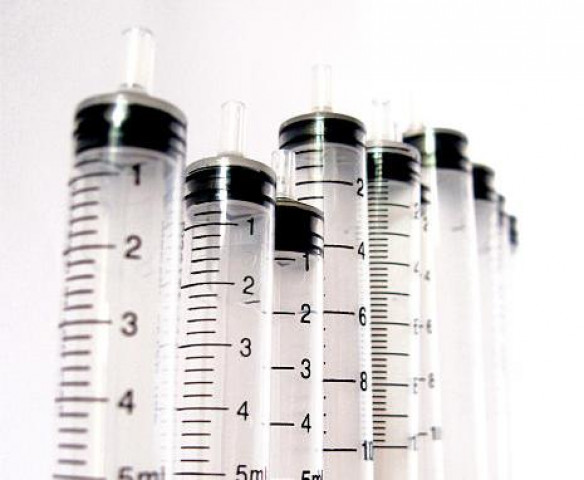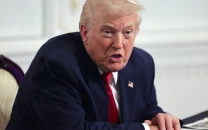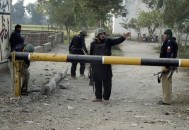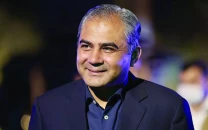Low cost Hepatitis C treatment: ‘Everything is heading in the right direction – on paper’
Dismay at ‘bureaucratic hurdles’ and delay. 100,000 injections previously produced worth Rs7million have expired.

Every year, three to four million people are infected with the Hepatitis C virus worldwide. PHOTO: FILE
In Pakistan, around 15 million people are Hepatitis C carriers. Of them, less than 2% are able to afford allopathic treatment since the cost is prohibitively high.
Against this backdrop, one could assume that a project promising to bring down the cost of treatment by thousands of rupees must have been the top priority of officialdom. However, no such luck.
No headway seems to have been made three months after a parliamentary panel gave the green light for the production of a local and low-cost version of interferon.
The Interferon Project Steering/Oversight Committee was formed in November 2012 and at the end of the month, the committee decided that the interferon production programme be revived from where it was left off four years ago.

In 2008, Dr Sheikh Riazuddin, one of the country’s leading molecular biologists, along with a group of researchers, manufactured a local version of Interferon at the Centre of Excellence in Molecular Biology (CEMB) of the Centre of Applied Molecular Biology (CAMB). German and US laboratories had tested the drug and declared that it met standards set by the World Health Organisation.
While imported interferon injections cost between Rs700 and Rs900 each, Dr Riazuddin had proposed that an injection be sold at Rs50.
“Everything is heading in the right direction – only on paper,” Professor Riazuddin told The Express Tribune. He is yet to receive an official letter reinstating or appointing him as the project in-charge. “I cannot do anything or even go to the lab without an official document,” he said.
“The team that worked with me has been dispersed and people making the decisions now know nothing about science. I have to work at the CAMB but that is not possible unless the local administration wants it to be so.”
He expressed dismay at ‘bureaucratic hurdles’, which, he said, would waste precious time in preventing the deaths of hundreds of patients. “Many precious lives could have been saved since 2008 had interferon been allowed to be manufactured commercially ... All I need is permission to use space at the CAMB. [I don’t need] any funds or paperwork. [Once I start working] we will be able to produce interferon; in two-years that will cater to the hepatitis C carriers,” the micro-biologist said.

According to Dr Riazuddin, Hepatitis C treatment costs between Rs60,000 to Rs100,000, which locally manufactured interferon would bring down to Rs10,000 at max.
Dr Javed Akram, who worked on the clinical side of the 2008 project, told The Express Tribune that the 100,000 injections previously produced and were worth Rs7million had expired. “We need to fast-track this work. Dr Riazuddin is ready, I am ready and the CAMB director is ready. Then what’s the problem? We just need a go-ahead.”
When contacted, Dr Tayyab Hasnain, the CAMB director said, “I know Dr Riazuddin and his team’s potential. He can manufacture interferon and am willing to give him space at the centre. I just need permission from the authorities concerned.”
MNA Yasmeen Rehman, who is the convener of the Public Accounts Committee (PAC)’s sub-committee on interferon, told The Express Tribune that she would ensure that all bureaucratic hindrances are removed so that production of interferon could start.
‘Low-cost interferon wasn’t acceptable to MNCs’
Dr Javed Akram, former principal of the Allama Iqbal Medical College Lahore, who was also part of the 2008 interferon project, told The Express Tribune that the team had manufactured some 100,000 interferon injections. “We were all set to proceed to the clinical trials when some pharmaceutical mafias emerged on the scene. They first asked us to sell our drug to them. At one point we agreed.” Dr Akram said that they had changed their mind about letting the pharma companies take over after they were told that the companies were thinking of selling an injection at a price that was “about 90% higher than our proposed price.”
“The purpose of manufacturing interferon locally would have died had we sold our research to the pharmaceutical companies,” he said.
After Professor Riaz’s contract as the CAMB director expired, Dr Akram took him to the AIMC. Dr Akram alleges that it was the pharmaceutical companies that “manoeuvred matters” to initiate misappropriation inquiries against the team.
A report by the Federal Investigation Agency (FIA), a copy of which is available with The Express Tribune, that was completed in October 2012 cleared Professor Riazuddin of embezzlement. “There is no evidence of any adverse remarks/bad report about him (Riazuddin). In fact all secretaries of the [Ministry of Science and Technology] spoke highly of him and rated him as a “national asset”, the report stated. It further said, “Professor Riazuddin is the most highly decorated biologist in the country with 20 national and international laurels to his credit, including Tamgha-i-Imtiaz, Sitara-i-Imtiaz and Hilal-i-Imtiaz.” The report noted that Dr Riazuddin had proposed to sell local version of interferon at a “throw-away” price of Rs70. “This was obviously not acceptable to the multinationals and their supporters in the government,” it states.
Other than the FIA, investigations by the National Accountability Bureau (NAB) and the Prime Minister’s Inspection Cell also found no truth in the allegations.
Hepatitis C cases on the rise in Pakistan
Every year, three to four million people are infected with the Hepatitis C virus worldwide. About 150 million are chronically infected and can develop liver cirrhosis or liver cancer. The disease is responsible for the deaths of more than 350,000 people every year, according to a website.
The prevalence of hepatitis C is steadily increasing in Pakistan. Dr Javed Akram, former principal of the Allama Iqbal Medical College, says about two million people in Pakistan suffer from the disease.
It is estimated that there will be over one million patients with liver cancer by 2028 if no corrective measures are adopted. The current total bed strength in hospitals across Pakistan is more than 100,000, which means the hospitals will be able to cater to only 10% of terminal cases by 2028. The World Health Organisation (WHO) National Officer on HIV and Hepatitis Control Programme Dr Quaid Saeed described the hepatitis situation in Pakistan as “bleak”. He said that if hepatitis patients continue to increase at the present rate, by 2028, 90% of the total beds in hospitals would be occupied by them.
According to Investment Management Association surveys in 2008, Pakistan imported interferon worth Rs2.3 billion as compared to Rs1.87 billion in 2007, Rs1.4 billion in 2006 and Rs1.1 billion in 2005. If the current demand rate continues, Pakistan will have to spend over Rs5 billion in 2020.
Published in The Express Tribune, February 28th, 2013.



















COMMENTS
Comments are moderated and generally will be posted if they are on-topic and not abusive.
For more information, please see our Comments FAQ